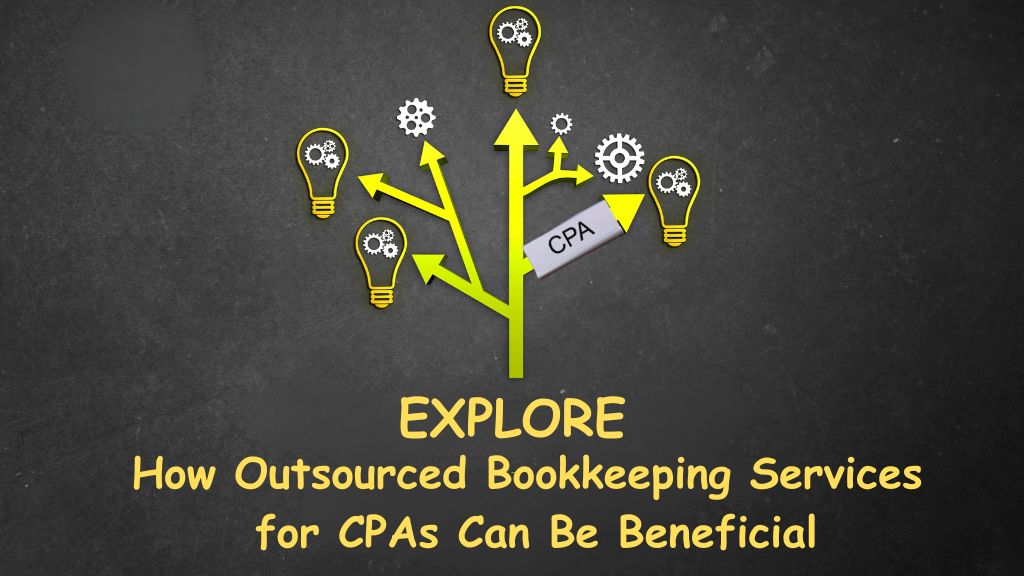Table of Content
- 1 What Are Outsourced Bookkeeping Services?
- 2 Why Do CPAs Need Outsourced Bookkeeping Services?
- 3 What Are the Benefits of Outsourced Bookkeeping Services for CPAs?
- 4 What Services Are Included in Outsourced Bookkeeping for CPAs?
- 5 How Do CPAs Choose the Right Outsourced Bookkeeping Service?
- 6 Frequently Asked Questions
- 6.1 1. What are outsourced bookkeeping services and why are they important for CPA firms?
- 6.2 2. What are the benefits of outsourcing bookkeeping for CPA firms?
- 6.3 3. What are the options for outsourcing bookkeeping for CPA firms?
- 6.4 4. How can outsourcing bookkeeping help CPA firms during the busy tax season?
- 6.5 5. What is the cost associated with outsourcing bookkeeping for CPA firms?
- 6.6 6. How can CPA firms ensure trust and reliability when outsourcing bookkeeping services?
In the rapidly evolving world of finance and accounting, Certified Public Accountants (CPAs) play a pivotal role in ensuring the financial health and compliance of businesses. However, the demands of modern accounting go beyond traditional number-crunching and tax preparation.
Today, CPAs find themselves juggling a myriad of responsibilities, from financial analysis and advisory services to staying updated with ever-changing regulations.
Amidst this complexity, many CPA firms are discovering the invaluable benefits of outsourcing their bookkeeping services. Outsourcing has become a strategic move that enables CPAs to offload time-consuming tasks, focus on high-value activities, and enhance overall client service.
This article delves into the world of outsourced bookkeeping services for CPAs, shedding light on the motivations, advantages, and best practices that can revolutionize the way CPA firms operate.
From cost-efficiency and scalability to access to a global talent pool, outsourcing offers a competitive edge that propels CPA firms into a new era of efficiency and profitability.
Prime Offshore Accounting navigates through the various facets of outsourced bookkeeping. In this article, we will explore how this strategic partnership can lead to increased client satisfaction, improved compliance, and ultimately, a more prosperous future for CPA professionals.
Join us on this insightful journey into the world of outsourced bookkeeping services, where collaboration and innovation redefine the role of CPAs in the modern financial landscape.
Key Takeaways:
- Outsourced bookkeeping services provide time management, cost savings, expertise and efficiency, and scalability for CPAs.
- Outsourcing bookkeeping allows CPAs to focus on their core competencies, access advanced technology, reduce the risk of errors, and increase client satisfaction.
- CPAs should evaluate services, consider experience and reputation, review security measures, and discuss pricing and contracts when choosing an outsourced bookkeeping service.
What Are Outsourced Bookkeeping Services?
Outsourced bookkeeping services are when a business hires an external company or professional to manage its financial record-keeping and accounting tasks.
These services typically involve tasks such as recording financial transactions, handling accounts payable services and accounts receivable services, reconciling bank statements, and creating financial reports.
Choosing to outsource bookkeeping services can bring various advantages, such as:
- Cost savings
- Increased accuracy
- Access to specialized expertise
- More time for business owners to focus on core activities
When considering outsourcing bookkeeping services, it is crucial to thoroughly research potential providers, review their qualifications and experience, and consider the specific needs of your business.
Factors to consider when selecting a provider may include:
- Cost
- Reliability
- Security measures
- Customer reviews
Why Do CPAs Need Outsourced Bookkeeping Services?
As a CPA, your time is extremely valuable. That’s why many CPAs are turning to outsourced bookkeeping services. By delegating the task of bookkeeping to a team of professionals, CPAs can free up their time to focus on more pressing matters.
But that’s not the only advantage. In this section, we will delve into the various reasons why CPAs are utilizing outsourced bookkeeping services, including the benefits of time management, cost savings, expertise and efficiency, and scalability for their business.
1. Time Management
To effectively manage time when considering outsourced bookkeeping services, CPAs can follow these steps:
- Evaluate how time is currently being allocated for bookkeeping tasks.
- Identify the specific bookkeeping tasks that can be outsourced.
- Research and select reputable outsourced bookkeeping service providers.
- Clearly communicate expectations and deadlines with the chosen provider.
- Regularly review and monitor the progress and quality of the outsourced bookkeeping tasks.
- Redirect the saved time towards core competencies and client-focused activities.
2. Cost Savings
Outsourcing bookkeeping services can lead to significant cost savings for CPAs. To find the most cost-effective option, consider the following steps:
- Evaluate Pricing: Compare the costs of different outsourced bookkeeping services to find the most affordable option.
- Consider Efficiency: Look for providers who can streamline processes and reduce the time spent on bookkeeping tasks.
- Assess Scalability: Choose a service that can accommodate your growing business needs without incurring additional costs.
- Review Additional Expenses: Consider any hidden fees or charges that may impact your overall cost savings.
By carefully considering these steps, CPAs can find outsourced bookkeeping services that offer both quality and cost-effectiveness, allowing them to focus on their core competencies and improve client satisfaction.
3. Expertise and Efficiency
Outsourced bookkeeping services provide CPAs with the expertise and efficiency needed to focus on their core competencies and improve overall efficiency. To find the right outsourced bookkeeping services, here are a few steps to follow:
- Evaluate their services: Look for providers that offer a wide range of bookkeeping services tailored to your specific needs.
- Consider their experience and reputation: Choose a company with a proven track record and positive reviews from other CPAs.
- Review their security measures: Make sure the service provider has robust security measures in place to protect sensitive financial data.
- Discuss pricing and contracts: Compare pricing structures and contract terms to find a provider that offers competitive rates and flexible agreements.
By following these steps, CPAs can find reliable outsourced bookkeeping services that provide both expertise and efficiency.
4. Scalability
Scalability is a crucial factor for CPAs when selecting outsourced bookkeeping services. To ensure scalability, CPAs can follow these steps:
- Evaluate the provider’s capability to handle increasing workloads and clients.
- Assess their flexibility to adapt to changing business needs and demands.
- Consider their technology infrastructure and capacity for efficient data management.
- Review their track record of successfully scaling operations for other clients.
By considering scalability, CPAs can find a bookkeeping service that can grow alongside their practice, ensuring smooth operations and satisfied clients.
What Are the Benefits of Outsourced Bookkeeping Services for CPAs?
As a CPA, your main focus is providing expert financial services to your clients. However, bookkeeping can often be a time-consuming and tedious task that detracts from your core competencies. This is where outsourced bookkeeping services can be incredibly beneficial.
In this section, we will discuss the advantages of outsourcing your bookkeeping needs, including the ability to focus on your core competencies, access to advanced technology, reduced risk of errors, and increased client satisfaction.
1. Focus on Core Competencies
Focusing on core competencies is essential for CPAs to provide top-quality services. To achieve this, CPAs can follow these steps:
- Identify core competencies: Determine the key areas where you excel and that are crucial to your clients.
- Assess non-core tasks: Evaluate tasks that fall outside of your core competencies, such as bookkeeping and administrative work.
- Outsource non-core tasks: Consider seeking reliable outsourced bookkeeping services to handle these tasks efficiently.
- Delegate and collaborate: Regularly communicate with the outsourced team, providing guidance and clarifications when needed.
- Monitor progress: Stay involved by reviewing reports and ensuring that the outsourced tasks align with your standards.
Fact: According to a survey by Deloitte, 59% of businesses outsource to focus on core competencies.
2. Access to Advanced Technology
Outsourced bookkeeping services offer CPAs access to advanced technology, empowering them to streamline their processes and improve efficiency. To choose the right service provider, CPAs should follow these steps:
- Evaluate the technology tools offered by each provider, such as cloud-based accounting software or automated data entry systems.
- Consider the provider’s experience and reputation in implementing and utilizing advanced technology in their bookkeeping processes, ensuring that they have the necessary expertise.
- Review the security measures in place to protect sensitive financial data while utilizing advanced technology, ensuring that the provider prioritizes data security.
- Discuss pricing and contracts to ensure that the cost of accessing advanced technology aligns with the value it provides, making sure it is a worthwhile investment.
3. Reduced Risk of Errors
Outsourced bookkeeping services offer CPAs a reduced risk of errors through their specialized expertise, technology, and quality control measures. To ensure minimized errors, follow these steps:
- Thoroughly evaluate the outsourced bookkeeping service, assessing their track record and client reviews.
- Review their technology and software systems to ensure efficient and accurate data processing.
- Assess their quality control measures, such as regular audits and error detection protocols.
- Communicate your specific needs and expectations regarding accuracy to the service provider.
By following these steps, CPAs can find reliable outsourced bookkeeping services that reduce the risk of errors and provide accurate financial reporting.
4. Increased Client Satisfaction
Outsourcing bookkeeping services for CPAs can lead to increased client satisfaction. By trusting professionals to handle their bookkeeping tasks, CPAs can enhance satisfaction in multiple ways:
- Improved accuracy: Expert bookkeepers ensure that financial records are accurate and free of errors.
- Timely reporting: Professional bookkeepers provide prompt financial reports, permitting CPAs to offer timely insights to their clients.
- Enhanced client communication: With bookkeeping tasks taken care of, CPAs can devote more time to communicating and building relationships with their clients.
- Increased value-added services: By freeing up time, CPAs can focus on providing additional advisory services, meeting clients’ specific needs, and delivering exceptional value.
By following these steps, CPAs can select the right outsourced bookkeeping service and ultimately improve client satisfaction.
What Services Are Included in Outsourced Bookkeeping for CPAs?
As a CPA, managing your client’s financial records can be a daunting task. That’s where outsourced bookkeeping services come in. But what exactly does this service include?
In this section, we will discuss the various components of outsourced bookkeeping for CPAs. From handling accounts payable and receivable to bank reconciliation and financial reporting, these services take the burden off of CPAs and ensure accurate and timely financial record-keeping.
We will also explore the benefits of outsourcing payroll processing, enabling CPAs to focus on other aspects of their clients’ financial management.
1. Accounts Payable and Receivable
Accounts payable and receivable are crucial aspects of outsourced bookkeeping services for CPAs. Here are the steps involved in managing these tasks:
- Receive and review invoices from vendors and suppliers.
- Verify the accuracy of the invoices and ensure they are in line with the agreed-upon terms.
- Record the invoices in the accounting system, categorizing them appropriately.
- Process payments to vendors within the specified payment terms.
- Monitor and reconcile accounts payable balances to ensure accuracy and proper cash flow management.
- Manage accounts receivable by generating and sending invoices to clients.
- Track and follow up on outstanding invoices to ensure timely payment.
- Record customer payments received and apply them correctly to outstanding invoices.
- Reconcile accounts receivable balances to ensure accuracy and proper cash flow management.
True Story: In 1995, Microsoft became the first tech company to outsource bookkeeping services in order to save time and reduce costs. This strategic decision helped Microsoft to focus on its core competencies and improve efficiency, ultimately leading to its tremendous success in the industry.
2. Bank Reconciliation
Performing the process of bank reconciliation is a crucial task for CPAs who utilize outsourced bookkeeping services. Here are the necessary steps involved in the bank reconciliation process:
- Collect bank statements and compare them to the bookkeeping records.
- Identify any discrepancies, such as missing transactions or incorrect amounts.
- Adjust the bookkeeping records to match the bank statements by adding or subtracting the necessary transactions.
- Reconcile any outstanding checks or deposits that have not yet cleared.
- Ensure that the ending balance on the bank statement matches the ending balance on the bookkeeping records.
Pro-tip: It is important to regularly reconcile your bank accounts to maintain accurate financial records and prevent any potential fraud or errors from going unnoticed.
3. Financial Reporting
Financial reporting is a crucial aspect of outsourced bookkeeping services for CPAs. Here are the steps involved:
- Compile Financial Data: Gather all relevant financial information such as income, expenses, and assets.
- Organize Data: Categorize and classify the financial data using appropriate accounting principles.
- Financial Reporting: Generate accurate financial statements including the balance sheet, income statement, and cash flow statement.
- Analyze Financial Performance: Evaluate the financial statements to assess the CPA’s financial health and identify areas for improvement.
- Generate Reports: Create comprehensive reports that provide insights into financial performance and assist in decision-making.
Fact: Accurate financial reporting is essential for regulatory compliance and building investor confidence.
4. Payroll Processing
Payroll processing is an essential task for CPAs, especially when utilizing outsourced bookkeeping services. To ensure a smooth payroll process, follow these steps:
- Gather employee information, including hours worked, wages, and deductions.
- Calculate gross wages based on hours worked and pay rates.
- Consider deductions, such as taxes, benefits, and retirement contributions.
- Issue paychecks or initiate direct deposit transfers.
- File payroll tax returns and make necessary payments to the IRS and state agencies.
- Provide employees with pay stubs and annual W-2 forms.
How Do CPAs Choose the Right Outsourced Bookkeeping Service?
As a CPA, finding the right outsourced bookkeeping service is crucial for maintaining the financial health of your client’s businesses. With so many options available, it can be overwhelming to choose the best fit for your needs.
In this section, we will discuss the key factors that CPAs should consider when selecting an outsourced bookkeeping service. From evaluating their services to reviewing their security measures, we will provide valuable insights to help you make an informed decision.
1. Evaluate Their Services
When considering outsourced bookkeeping services for CPAs, it is important to follow these steps:
- Review the range of services offered to ensure they meet your specific needs.
- Assess the expertise in your industry or specialization to ensure they understand your unique requirements.
- Check their track record and reputation by reading client testimonials or requesting references.
- Evaluate their technology and software capabilities to ensure they can efficiently handle your workload.
Lastly, compare pricing and contracts to find a service that fits your budget and offers flexibility. It is important to prioritize quality and reliability over cost alone.
2. Consider Their Experience and Reputation
To ensure the right outsourced bookkeeping service for CPAs, it is important to consider the experience and reputation of potential providers. Here are the steps to follow:
- Research their track record: Look for established providers with a proven history of delivering reliable bookkeeping services.
- Read client reviews: Check online platforms and ask for references to gauge satisfaction levels and the quality of their work.
- Assess industry knowledge: Confirm that the service provider has experience working with CPAs and understands the unique requirements of the profession.
- Consider their expertise: Look for a service provider with specialized knowledge in areas like tax compliance, financial reporting, and industry-specific regulations.
Pro-tip: When making your decision, do not solely rely on price. It is important to choose a reputable and experienced outsourced bookkeeping service that can provide long-term value and peace of mind.
3. Review Their Security Measures
Reviewing the security measures of outsourced bookkeeping services is crucial for CPAs to ensure the protection of sensitive financial information. Here are key steps to follow:
- Evaluate the service provider’s data encryption methods and protocols.
- Assess their physical security measures, such as restricted access to servers and secure storage facilities.
- Review their employee background checks and confidentiality agreements.
- Verify their disaster recovery plans and backup systems to ensure data integrity and availability.
- Inquire about their cybersecurity practices, including firewall protection, antivirus software, and regular security audits.
4. Discuss Pricing and Contracts
When discussing pricing and contracts for outsourced bookkeeping services, CPAs should follow these steps:
- Evaluate the pricing structures and packages offered by various service providers.
- Consider the flexibility of contract terms and the ability to customize services based on specific needs.
- Review any additional fees or charges that may be involved, such as setup fees or transaction fees.
- Assess the level of transparency in pricing and contract details to ensure clear communication and understanding.
By following these steps, CPAs can make well-informed decisions about pricing and contracts for outsourced bookkeeping services that align with their budget and requirements.
Frequently Asked Questions
1. What are outsourced bookkeeping services and why are they important for CPA firms?
Outsourced bookkeeping services involve hiring a third-party organization to handle a business’s financial data processing, such as income statements, balance sheets, and cash flow statements.
This allows CPA firms to focus on their core business processes, acquire clients, and experience financial relief. In today’s fast-paced and technology-driven world, outsourcing bookkeeping has become a popular and essential option for CPA firms to efficiently manage their financials.
2. What are the benefits of outsourcing bookkeeping for CPA firms?
Outsourcing bookkeeping offers many advantages for CPA firms, including lower labor cost structure, optimum utilization of resources, access to modern accounting software and expertise, and uplifted market competitiveness.
It also enables CPA firms to save time and money while ensuring high-quality services.
3. What are the options for outsourcing bookkeeping for CPA firms?
There are various options for outsourcing bookkeeping, including hiring a virtual bookkeeper, using online software models, or working with a local bookkeeping service.
CPA firms can also choose to work with a cloud accounting firm or a virtual firm with skilled bookkeepers and accounting professionals. Each option offers unique benefits, and CPA firms must carefully consider their needs before deciding.
4. How can outsourcing bookkeeping help CPA firms during the busy tax season?
Outsourcing bookkeeping can be a critical time-saving technique for CPA firms during the busy tax season. By delegating tax filing activities to a dedicated team of experts, CPA firms can ensure timely and accurate tax preparation services for their clients.
This empowers CPA firms to focus on running their operations and providing excellent client service.
5. What is the cost associated with outsourcing bookkeeping for CPA firms?
The cost of outsourcing bookkeeping for CPA firms depends on the chosen deployment model and the services required. However, it is generally a more cost-effective option than hiring an in-house bookkeeper.
Additionally, outsourcing bookkeeping allows CPA firms to save on expenses such as buying licenses for accounting software or conducting training sessions for their in-house accounting team.
6. How can CPA firms ensure trust and reliability when outsourcing bookkeeping services?
When outsourcing bookkeeping, CPA firms must choose a reliable company with a proven track record and experience in the industry.
Look for certifications and accreditations that demonstrate the company’s expertise, and read client reviews or testimonials to get a better understanding of their services.
Additionally, make sure the outsourcing company follows IRS-compliant practices and provides secure methods for handling financial data, such as using a cloud hosting model.








